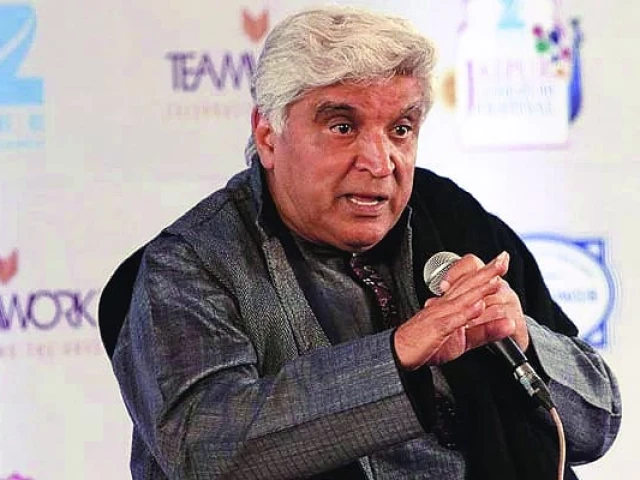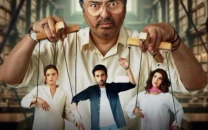Javed Akhtar: A mouthpiece with a memory hole
Writer's recycled remarks on cross-border art reveal the limits of liberal memory

It's becoming difficult to watch Javed Akhtar without feeling profound pity over his descent from a mid-tier writer to a bitter provocateur. And no, that's not an ad hominem. Bollywood has given Pakistani audiences many icons to love. Even when some of them turn into vitriol-spewing mouthpieces for the far right, fandom on this side of the border has often trumped jingoism.
That is not some unique generosity Pakistanis are blessed with. It is, however, indicative of a more organic circulation of art that has survived decades of regional instability and repression, and comes with multiple, if partial, reality checks. For every inane political take, one can hope for a sane needle in the haystack. In Modi's India, both the needle and the haystack are saffron.
Akhtar's response to Pakistani artists working in India in the aftermath of Pahalgam is that saffron needle begging to be found. In conversation with Indian news agency PTI, the screenwriter insisted that India allowing Pakistani artists to work has always been "one-way traffic". Citing visits by Nusrat Fateh Ali Khan, Mehdi Hasan, Ghulam Ali, and Noor Jehan, Akhtar maintained that the Indian government treated these artists to ornate protocol. Even Faiz Ahmed Faiz, whom he calls "a poet of the subcontinent" and not a "Pakistani poet," was received with complete decorum.
"I am afraid this has never been reciprocated. I have no complaint with the people of Pakistan. Big poets of Pakistan have written poems for Lata Mangeshkar. I'm quite convinced that in the '60s and '70s, Lata Mangeshkar, hands down, was the most popular Indian in Pakistan.
But why was there not a single performance of hers in Pakistan? We have received their artists with open arms, but it was not reciprocated by [the] establishment." Any familiarity with this statement is not at all coincidental. Akhtar had the same intellectual miscarriage in 2023 when he was visiting Lahore for Faiz Festival.
Same old drivel
There is something both tired and dangerous in this recurring refrain. Tired, because it has been said and corrected before. Dangerous, because it reeks of a culturally coded nationalism that dresses up state policy as artistic grievance. Akhtar's remarks, delivered from a Pakistani stage, betray not only a lack of historical memory but also an opportunistic blindness to what transnational exchange has really looked like in the subcontinent.
Let's begin with the obvious counterexamples. Indian singers, poets, actors, and artists have repeatedly been hosted in Pakistan with state patronage and fanfare. In February 1999, Akhtar himself was part of the official cultural delegation accompanying Prime Minister Atal Bihari Vajpayee on his historic state visit to Lahore. Alongside Akhtar were Dev Anand, Shatrughan Sinha, Satish Gujral, Mallika Sarabhai, Kuldip Nayar, and Kapil Dev — all accorded state guest status by then-Prime Minister Nawaz Sharif's government.
Just the year before, the late Bollywood Peshawar-born icon Dilip Kumar received Pakistan's highest civilian award, Nishane Imtiaz, for his contribution to the arts. In 2004, Jagjit Singh performed at various venues, including Karachi's DHA Golf Club, to further Pakistan-India ties. In August 2010, Prime Minister Yousuf Raza Gilani publicly invited Bharat Ratna Lata Mangeshkar to Pakistan as a state guest, urging her to visit for her millions of fans. Singer Adnan Sami, then still a Pakistani citizen, was asked to help coordinate the visit.
These events are not obscure trivia. They are widely reported, highly visible, and factually refute Akhtar's portrayal of Pakistani cultural policy as some sort of paranoid nationalist lockdown. On the contrary, it is both exhausting and futile to chart all the instances of Indian artists being welcomed by the Pakistani government or vice versa, for all it will reflect is two state narratives, a postcolonial collateral of long-standing tensions.
Akhtar can posture as the subcontinent's conscience all he wants, but one wonders why anyone would willingly commit to a life of such hypocrisy: dissenter in exile, mouthpiece at home. Any overview of his cognitive dissonance treads risky waters, especially when he's still processing childhood trauma at this ripe age. But even the most afflicting darde disco wouldn't possess a teenager, let alone an 80-year-old, to sustain a hormonal rebellion long past its expiry date.
Ghosts of his past
Perhaps, the most painful recall that accompanies Akhtar is who preceded him. Born to the hardline communist poet Jan Nisar Akhtar and son-in-law to the equally principled Kaifi Azmi, his journey from self-proclaimed Marxist to a muddled, undifferentiated leftist ought to be taught as a cautionary tale for progressives. Akhtar is emblematic of a collapsing liberal intelligentsia; famous for knowing what it stands against (BJP, Hindutva, censorship), yet rarely able to articulate what it stands for. On the other hand, he is a lonely, tormented man living in a country that simply won't love him back.
Given his steady decline in sense, it may be wiser to analyse him through the latter lens. For if not unresolved daddy issues, what else could explain his 180-degree pivot from everything India's progressives once stood for? Only a staunch right-winger could look at the world in 2025 and still believe in an "average citizen" enjoying enviable "privileges and freedoms" anywhere. It's easy, then, to frame Pakistan as a stage-hungry neighbour whose stars come begging, and India, the benevolent patron left unthanked. But this framing doesn't hold up, not even within the dynamics of cross-border stardom.
Beyond the borders
Art nationalism, the idea that cultural production must mirror the state's image of itself, is always a tool of authoritarianism. When Akhtar scolds Pakistan for failing to reciprocate a cultural embrace, what he's really doing is echoing India's current border-thickening regime: a belief that art must serve the state, or else be exiled as suspect. What should be a call for solidarity becomes, in Akhtar's voice, a lament that Pakistan isn't doing nationalism as well as India.
But cultural power doesn't require symmetry to be meaningful. Many Pakistani artists who found fame in India — Fawad Khan, Mahira Khan, Atif Aslam — were already icons at home. So were legends like Nusrat Fateh Ali Khan, Mehdi Hasan, and Noor Jehan, undoubtedly recognised as subcontinental greats, despite Indian nationalism’s impulse to retroactively disown them. That these artists were embraced by Indian fans doesn’t make them guests at a magnanimous banquet — it reflects the porous, vibrant, and horizontal nature of cultural affinity.
In reality, India's entertainment industry has long benefitted from Pakistani creativity — copying music, borrowing ghazal traditions, and riding on the realism of Pakistani TV dramas when their own serials degenerated into surrealist saas-bahu battles. Visibility has not been a one-way traffic — it's been a quiet, continuous churn of influence, often uncredited, but deeply felt.
What is conveniently left out of Akhtar’s telling is the asymmetry of scale, not affection. India has a gargantuan industry with global distribution and diaspora capital. Pakistan, by contrast, has a far smaller market, still grappling with censorship boards, moral policing, and a fragile infrastructure. It doesn’t mean Indian artists aren’t welcome — it means there are simply fewer big-budget platforms to host cross-border productions. It appears that what Akhtar really laments is Pakistan’s relatively slower embrace of big, flashy capital. All the homegrown literary, art, and academic spaces that have repeatedly hosted the Indian cultural elite merit no recognition from him. As for the supposed perks enjoyed by the mythical “average Indian” — enviable enough to single-handedly provoke terrorism — they remain less a lived reality and more a projection of India’s hegemonic ambitions in South Asia.
If only Akhtar, on his many visits to Pakistan, had grasped what Fahmida Riaz once so wisely penned: "tum bilkul ham jaise nikle." The exchange of violence and repression between Pakistan and India has always been a two-way traffic. Just as the flow of art and dissent has never respected borders.
Have something to add to the story? Share it in the comments below.



















COMMENTS (8)
Comments are moderated and generally will be posted if they are on-topic and not abusive.
For more information, please see our Comments FAQ